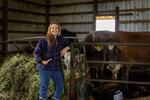A group of four dairy farmers is suing the Oregon Department of Agriculture over a new policy that they say will threaten their small businesses.
Starting April 1, some small dairies will need to register as Confined Animal Feeding Operations, or they could face fines. That process includes creating a plan for wastewater management.

Sarah King owns Godspeed Farms, a three-cow operation. She's one of the farmers suing the Oregon Department of Agriculture.
Courtesy of Institute for Justice
In a memo last year, the ODA said some raw milk producers were ignoring the registration requirement. The agency said this has created environmental concerns, and other dairies had complained about unfair competition.
Now, some farmers are pushing back. On Jan. 24, they filed a complaint in federal court, arguing that the requirements don’t reflect how small businesses operate. And they accused the state of protecting the corporate milk industry. The lawsuit was first reported by the Statesman Journal.
“These farms are not in competition,” Bobbi Taylor, a lawyer for the plaintiffs, told KLCC. “They sell a different product. Their customers seek them out, because they’re a small farm, they sell raw milk, their operation is sustainable, and their customers prefer to buy small.”
In an email, the ODA declined to comment or provide further information about its policies.
The farmers
One of the plaintiffs is Sarah King. She’s the owner of Godspeed Hollow Farm in Newberg, a three-cow operation that sells raw milk as a subscription service.
King disputes the state’s threshold for confinement. Currently, it’s defined by a number of days, not by how long an animal spends inside or outside. She said her free-roaming animals would qualify under that criteria, since she brings them in every morning to milk.
“Milking cows out in the middle of the field in the dark at five o’clock in the morning in the middle of January is not pleasant,” said King. “And so I really do appreciate being able to bring them into my warm and dry barn to do that even for those 10 or 15 minutes.”
King said the small amount of waste her animals create is not an environmental hazard, and instead fertilizes her land. She’s worried that under these regulations, she’d have to buy expensive equipment and undertake extensive data collection.
“It definitely makes me concerned about my own ability to stay in production in a way that achieves the goals that we have for our farm, which is to be an environmentally friendly and restorative process,” said King. “I don’t know that the level of access that I provide for families today would be able to continue.”
The lawsuit comes amid debate around unpasteurized milk in Oregon. Such milk can’t be sold in stores, but farmers can sell it directly to consumers. Advocates tout the healthy bacteria they say is killed in the pasteurization process.
However, the Centers for Disease Control and Prevention advises the public not to consume raw milk, citing a heightened risk of serious foodborne illness and a lack of evidence for health benefits. The agency says good farming practices and regular testing of animals don’t eliminate a risk of infection.